
Download the PDF of Outdoors: Set Free
The now-famous comment of early years pioneer Margaret McMillan – ‘The best classroom and the richest cupboard is roofed only by the sky’ – appears prominently on the website of Dandelion Education, and fittingly so. Provision at this Norfolk setting, founded in 2015, is entirely outdoors. It is also exceptional in that it combines two approaches: that of Forest School and that of Philosophy for Children, thus providing a distinct experience of learning and development.
Its innovative provision and excellent practice were recognised at last year’s Nursery World Awards when it was named Nursery of the Year. Having been shortlisted by a group of experts, consultant Wendy Scott OBE judged Dandelion the winner from an exceptional list of contenders.
‘Dandelion,’ she says, ‘offers an inviting range of open-ended activities involving physical and intellectual challenges coupled with strong and sensitive emotional and social support.’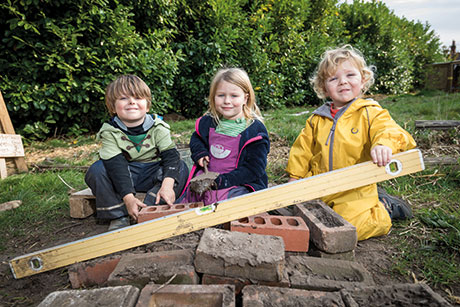
SWITCHING ON TO LEARNING
Dandelion was founded and is managed by Hayley Room and Emma Harwood, both experienced primary school teachers and long-term friends. ‘We are passionate about education and working with children,’ explains Ms Room. ‘Emma was also a Forest School practitioner, and I had a keen interest in using Philosophy for Children as a tool for learning and development, both intellectually and emotionally.
‘We decided to leave state education, as we had become disillusioned, feeling that the system no longer met the needs of children. We observed far too many children “switching off” from learning: they were becoming demotivated, lacking in independence and not developing in creative and critical thought.’
In response, they set themselves the goal of finding a way to foster that wonderful curiosity that children have and to engender a pleasure and satisfaction in learning.
‘Dandelion began when Emma and I sat in her garden, under a magnolia tree, discussing the system and what education should really look like,’ continues Ms Room. ‘By the end of the conversation, we’d decided to implement the change we wanted to see and create something new and different. We both firmly believed in our specialist areas and thought the marriage of the two seemed obvious, and totally unique.’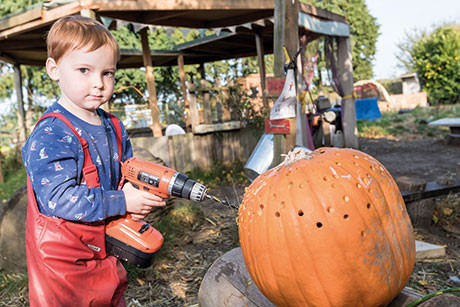
FOREST SCHOOL: PRACTICE AND ETHOS
At Dandelion, the concept of toys and resources is quite unlike that in many settings: the familiar sight of shelves, cupboards and baskets full of games, dolls, crafts and so on is not to be seen. It is not that toys and play things do not exist – they certainly do and, indeed, are at the heart of the child’s daily experience. The principal difference is that they are all designed and made by the children.
They do this by using only the natural resources found in their immediate surroundings. This is based on an understanding that the child’s imagination is stimulated and developed by such natural resources – it requires that the children develop their creative thinking and playing space.
To use such resources, the children need to learn how to use the necessary, real tools – a vital part of their bespoke provision. Ms Room explains, ‘A fundamental element of our model at Dandelion is that the children are taught how to be safe and competent with tools. Skilled and trained adults work with children as young as two on a one-to-one basis. Older children, who become proficient in the use of tools, can move on to using them independently.’
The type of toy made depends on the particular child’s needs and interests at the time: they might want to make a robot, a swing, a slide, a mobile phone, a mini shed, and so on.
‘The only limit is the imagination,’ says Ms Room. ‘The ethos and approach at Dandelion considers “standard” or “catalogue-ordered” toys as inherently closed, thus impeding the child’s desire and ability to invent. If a child wants a car or puzzle to play with then they make one.’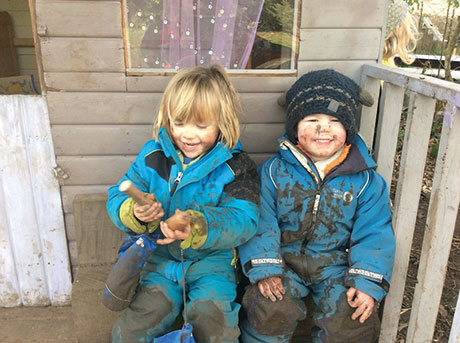
TIME AND SPACE
Ms Scott found much to applaud in Dandelion’s approach. ‘The practice at Dandelion is well grounded in the theoretical foundations of mathematical, scientific and literacy learning,’ she explains. ‘Children are given the time and space needed for active involvement and experimentation in their chosen areas of interest – it is an unhurried learning environment. All investigations are supported by discussion, allowing for the development of their thought processes and fostering of further curiosity.’
This is endorsed by many parents who really value this extraordinary space – not only the physical space that might be expected in a Forest School, but also the space into which their children can grow, developing as individuals with their particular areas of interest and intrigue. The children at Dandelion are essentially free – free to explore, try out, express themselves in a variety of ways and surprise themselves – and all done in a safe and flexible environment.
‘The ethos is exceptionally respectful,’ adds Ms Scott, ‘and staff follow the children’s interest, giving them freedom to climb, dig, explore, collect, share and create.’
This is endorsed by many parents who speak glowingly of the setting. One says, ‘Dandelion Education has been a breath of fresh air for our family and a real game-changer. Here, we have found a place where our child’s self-confidence, independence and awareness of others is being lovingly nurtured, while at the same time his desire to explore, experiment, create and question is supported and encouraged.
‘The adults are very conscious and considered in their use of language to show the children that they are respected and, in turn, they are guided to treat others with respect and compassion. Our son is treated as the individual human that he is and we couldn’t be happier with this approach.’
The children also delight in their experiences and, as might be anticipated, are encouraged to articulate their own thoughts:
‘I like the mud kitchen and water area because I like getting wet and muddy’
‘I like making things with edges’
‘I love to swing, swing, swing, swing, swing’
‘I like making boats and playing’
‘I like making robots and monsters’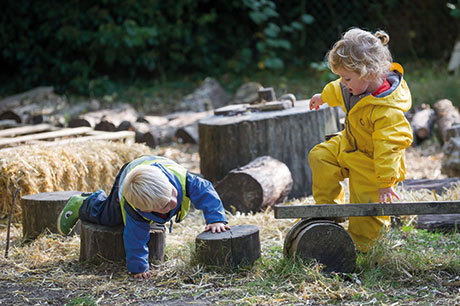
PHILOSOPHY FOR CHILDREN
The notion of engaging in questions of philosophy with two- to four-year-olds was thought by some to be one ambition too far. Ms Harwood explains, ‘Admittedly, at first it was a challenge. We spent a lot of time refining how to present philosophical enquiry to such young children.
‘Now we are confident that children as young as two can take part. By three and four, they are able to make a deep, insightful contribution based on their continually developing creative and critical thinking skills.’
The Society for Advancing Philosophical Enquiry and Reflection (SAPERE) is a charity that promotes Philosophy for Children as an educational method. Research shows that it has both cognitive and social impact on children. At the heart of the practice is philosophical enquiry, where a trained teacher encourages children to think and reason as a group. It is not, however, a basic practice – rigorous training is required.
Ms Scott notes, ‘The staff being trained in SAPERE Philosophy for Children adds a significant extra dimension to the approach at Dandelion – depth as well as breadth.’
Families are noticing its impact on their children’s learning. One parent says, ‘We have noticed how Dandelion’s Philosophy for Children has had a really positive impact on our three-year-old. His vocabulary has rapidly improved, his participation in family discussions has increased, and so has his perceptiveness and empathy for others.
‘Recently, when one of his older sisters said something provocative, he replied, “Thank you for your idea, but I don’t agree.” That made us smile but it reflects the social skills and respect he is learning at Dandelion.’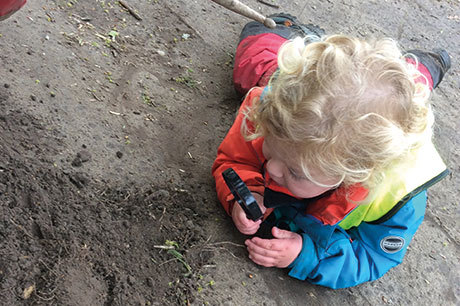
SPECIAL EDUCATIONAL NEEDS AND DISABILITIES
Several families have approached Dandelion because of the additional needs of their child, in particular children presenting with symptoms related to attention deficit hyperactivity disorder (ADHD) and autistic spectrum disorders (ASD). The outdoor environment and Dandelion’s inclusive approach have enabled these children to settle and to thrive.
‘One family left Dandelion after over a year in our nursery to start in Reception,’ explains Ms Harwood. ‘However, within weeks it became apparent that a school environment did not meet the child’s needs – the child had been assessed as meeting at least two of the ASD criteria. The family returned to Dandelion and the child has an individual graduated plan, space in the environment that helps her feel safe and, importantly, staff who know and understand her.’
The staff meet frequently with the parents, who tell them that Dandelion is the place she will go to without her usual extreme anxiety.
Ms Harwood thinks this is partly due to environment. ‘Our environment is calming,’ she says. ‘Children have space to interact as suits them. There is not a barrage of light and sounds as in many schools, where the walls are covered in bright colours and continually changing displays.’
The staff meet regularly with parents and tailor differentiated plans to meet the child’s individual needs, and aspirations. Quality training in SEND is paramount for all staff. Ms Harwood has been awarded the National SENCO Award (an MA-level qualification) and Ms Room has training and experience of working with children with complex additional needs. ‘We make sure any in-house training is high-quality,’ says Ms Harwood.
LINKS WITH FAMILIES AND THE WIDER COMMUNITY
Close dialogue with families is a high priority. The aim at Dandelion is to be flexible and find arrangements for children and families that are particular to them and their unique stage of development.
On offer to parents is ‘flexi-schooling’ – some parents choose to keep their children at Dandelion for their Reception year while others, in agreement with their primary school, stay on at Dandelion for two days a week. It all depends on the child and family.
Dandelion maintains links with students throughout the education sectors. It has close connections with its feeder primary schools, offers work experience to secondary school pupils, and welcomes both PGCE and Erasmus students.
Erasmus is a programme funded by the European Community that offers university students the possibility of studying or doing an internship abroad. Dandelion is, indeed, a very open as well as open-air environment.
CHALLENGES
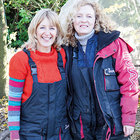 Initially, the idea of being outside for the entire day, sometimes from 8.00am to 4.30pm, was thought by some as not possible all year round. ‘However, we have clearly proved them wrong,’ says Ms Harwood. ‘With the right kit, a few shelters and well-trained staff, it is not only possible but definitely preferable.’
Initially, the idea of being outside for the entire day, sometimes from 8.00am to 4.30pm, was thought by some as not possible all year round. ‘However, we have clearly proved them wrong,’ says Ms Harwood. ‘With the right kit, a few shelters and well-trained staff, it is not only possible but definitely preferable.’
The parents are responsible for buying the kit, which can be expensive if bought new. However, buying second-hand, swapping between families and handing kits on once the children have outgrown them are encouraged. A stock of spare clothing for children is also there for any who need it. ‘We have had families who could not afford the kit, but this hasn’t been a problem – we’ve always found a way to provide it.’
Currently, money is the main challenge, with local authority funding not being enough to cover costs. Ms Harwood explains, ‘We are affected particularly as we insist on employing highly qualified staff. We believe that a qualified teacher should lead all nursery settings – early education must be valued and the expectation must be that staff are qualified in the same way as in schools.’
Having said that, Dandelion is attracting many teachers who are leaving the classroom to work for it because of the quality of what is on offer, despite a considerable pay cut.
AND FINALLY…
Fundamentally, Dandelion Education is grounded in rigorous principles of education and care put into practice in a tirelessly dynamic and vibrant way. It may come as no surprise that the plan is to open another nursery, enabling more families to share in this very effective approach to early education and care.
Without doubt, every parent would like to pick up their child from nursery and echo the thoughts of this parent, ‘We love seeing his gigantic grin shining through his muddy little face at the end of the day. We only wish there were a Dandelion for grown-ups… we’d be first in line!’
WHAT THE PARENTS SAY…
‘My daughter loves Dandelion. She thrives on being outside in all weathers, engaging in all the activities, playing with friends and being nurtured by all the wonderful staff. I’ve seen her become ever more strong, brave, confident, imaginative, inventive, caring, articulate and bright, and I believe that Dandelion has been instrumental in her development.
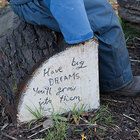 ‘She loves philosophy lunches, snack time around the fire, climbing, construction, the mud kitchen, gardening, reading, writing and every other aspect of a Dandelion day. I believe it is a uniquely magical place. I only wish that they could start a primary school in time for her Reception year.’
‘She loves philosophy lunches, snack time around the fire, climbing, construction, the mud kitchen, gardening, reading, writing and every other aspect of a Dandelion day. I believe it is a uniquely magical place. I only wish that they could start a primary school in time for her Reception year.’
‘Dandelion has been a wonderful experience for our three-year-old son. The environment itself is engaging, exciting, interesting and educational, with plenty of opportunities for learning, and developing physical and social skills. Our son has come on in leaps and bounds in six months.’









